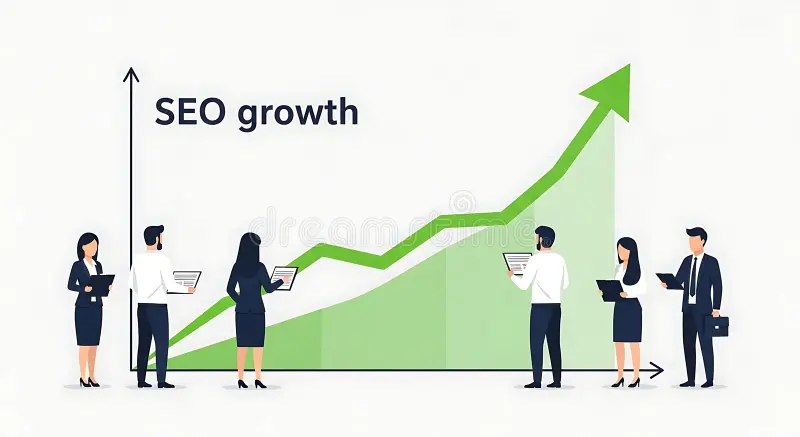



The term ‘AI SEO’ is popping up everywhere. With Google’s AI Overviews changing the look of search results, it’s only natural for business owners and marketers to wonder if they need a completely new playbook. Are the SEO strategies that have worked for years now obsolete? Do you need to learn a whole new set of rules just to stay visible?
The short answer, straight from the source, is no. But the full story is a bit more nuanced. While you don’t need to throw out your entire SEO strategy, understanding how AI is woven into Google’s fabric is key to future-proofing your business. We're here to cut through the hype and give you the straight facts on what's changing, what isn't, and what your business actually needs to do to keep driving revenue through search.
The rapid evolution of Google's search capabilities might feel sudden, but it’s been a long time coming. AI isn't a new guest at the party; it’s been shaping search results for over a decade. Technologies like RankBrain, which helps Google understand the context of new or ambiguous queries, have been integral for years. More recently, the Multitask Unified Model (MUM) has further enhanced Google's ability to grasp complex information across different languages and formats.
What we're witnessing in 2025 is the culmination of this work, made more visible through features like Google’s Search Generative Experience (SGE). This technology aims to deliver more direct, comprehensive answers right on the results page. With Google processing a staggering 8.5 billion searches every single day, the push towards using AI to provide instantaneous and relevant answers is a logical step. It’s a shift from just showing links to directly answering a user's intent, powered by a sophisticated AI infrastructure that’s been built and refined over many years.
Amidst the growing chatter and anxiety around "AI SEO," Google has been surprisingly direct. According to Google's own Search Liaison, Gary Illyes, businesses do not need to worry about specialised optimisation for AI. In a clear statement, he confirmed that "AI SEO" is not a real thing and that the standard SEO practices you already use are what’s needed for both AI Overviews and the broader AI-powered search experience.
Why is this the case? Because Google’s AI features are built on its existing foundation. They use the same crawlers, the same core index, and the same fundamental ranking systems that have been in place for years. AI Overviews generate answers by pulling information from high-quality web pages that already rank well. In short, if your website is already optimised for users and follows SEO best practices, you are already optimising for AI Search.
Furthermore, Google has repeatedly emphasised its focus on content quality, regardless of how it's produced. Their systems are designed to reward helpful, reliable, people-first content. Whether you write it yourself or use AI tools to assist, the final output's quality is what matters for visibility, not the method of creation.
So, if a separate "AI SEO" strategy isn't necessary, does that mean traditional SEO is unchanged? Not exactly. It means the core principles are more important than ever. Think of it this way: AI Overviews need raw material to generate answers, and that material is your high-quality, well-optimised content.
Foundational SEO elements remain the backbone of visibility:
AI technologies like RankBrain don't replace these pillars; they lean on them. RankBrain refines search results by better interpreting the intent behind a query, which in turn elevates content that truly satisfies that intent. Your traditional SEO efforts are what make your content a prime candidate for both standard and AI-generated results.
SEO has always been a practice of adaptation. From the early days of keyword stuffing to the Panda update prioritising content quality and the rise of mobile-first indexing, change is the only constant. The integration of AI, from RankBrain to MUM and now SGE, is simply the next chapter in this evolution.
The future of SEO, as predicted by industry experts, will involve an even deeper focus on user intent. AI tools will offer profound insights into not just what people search for, but why they search for it and what they expect to find. This allows businesses to move beyond matching keywords to truly serving the underlying needs of their audience. This shift isn't happening in a vacuum; it’s part of a broader transformation in digital marketing where personalisation and data-driven insights are becoming standard. SEO practices are evolving from a set of technical tasks to a more strategic function centred on creating genuinely helpful user experiences.
If there is one message Google has repeated consistently, it’s this: create helpful, reliable, people-first content. This principle is the north star for modern SEO and is even more critical in an AI-driven search world. AI Overviews and other generative features are designed to synthesise information from the web's most trustworthy sources. If your content isn't up to scratch, it simply won't be considered.
AI algorithms are becoming increasingly sophisticated at evaluating content quality. They look beyond keyword density to assess factors like:
For your business, this means doubling down on what works. Invest in thorough research, feature expert insights, keep your information up-to-date, and write for your audience first and foremost. Google’s reassurance that quality trumps creation method should empower content creators to use AI as a tool for efficiency, while the human touch provides the expertise and unique perspective that algorithms reward.
Embracing AI doesn't require a massive budget or a team of data scientists. It’s about strategically incorporating tools that make your existing SEO efforts more effective and efficient. Many of the platforms you may already use, like Ahrefs and SEMrush, now have powerful AI features built-in. Other tools like Surfer SEO are designed specifically for AI-assisted content optimisation.
Here are some practical ways to integrate these tools:
The goal is to let AI handle the repetitive, data-heavy lifting. This frees up your time to focus on strategy, creativity, and building the human connections that drive real business growth.
Despite the opportunities, adopting AI in SEO isn't without its challenges. Some businesses are hesitant due to the perceived cost of tools or the technical skills required to use them effectively. Another common hurdle is the risk of becoming over-reliant on AI, leading to generic, soulless content that fails to connect with an audience.
The biggest misconception, however, is the belief that "AI SEO" is a separate, complex discipline that requires abandoning traditional practices. As Google has made clear, this is not the case. The real challenge is not learning a new set of rules, but learning how to effectively weave new tools into a proven framework.
To overcome these hurdles:
The rise of AI in search is not a doomsday clock for your business; it’s an opportunity. By embracing AI-enhanced tools, you can future-proof your strategy, gain a competitive edge, and gain a deeper understanding of your customers than ever before. Businesses that adapt will be better positioned to not only survive but thrive.
Rather than fearing change, view AI as a catalyst for growth. The insights provided by these technologies can help you create more effective marketing campaigns, improve audience engagement, and ultimately drive more sales. The key is to stay informed, remain adaptable, and focus on the timeless principles of effective marketing: understanding your audience and delivering genuine value to them.
By integrating AI tools to streamline your processes and doubling down on high-quality, human-centric content, you are perfectly positioning your business for success. You don't need to chase a mythical "AI SEO" strategy. You just need to continue doing great SEO, now with more powerful tools at your disposal.

We value your privacy
We use cookies to enhance your browsing experience, serve content, and analyse our traffic. By clicking "Accept All," you consent to our use of cookies. Cookie Policy

